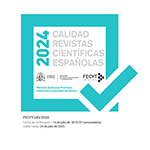The reality of Arab-Muslim migrant women: analysis of their integration and social participation in Andalusia (Spain)
Abstract
The social inclusion of Muslim women in Andalusia (Spain) is very important. Social integration is conceived as the ability to actively participate in the host society. In this article, we present the main findings of a research aimed at analysing four key issues that directly influence this group's social integration process: (1) social isolation; (2) religion, language and veil; (3) work carried out in Andalusia; and (4) effects arising from the pandemic. We used a qualitative methodology to conduct the study, with in depth interviews to reflect the views of our key informants. The results show the need to implement effective actions that encourage the integration and social participation of Moroccan women in Andalusia and eradicate situations of social exclusion. It is essential to be aware of this reality in order to make this group visible, to advance their human rights and to achive their empowerment in the host society.
Downloads
Article download
License
In order to support the global exchange of knowledge, the journal Cuadernos de Trabajo Social is allowing unrestricted access to its content as from its publication in this electronic edition, and as such it is an open-access journal. The originals published in this journal are the property of the Complutense University of Madrid and any reproduction thereof in full or in part must cite the source. All content is distributed under a Creative Commons Attribution 4.0 use and distribution licence (CC BY 4.0). This circumstance must be expressly stated in these terms where necessary. You can view the summary and the complete legal text of the licence.









